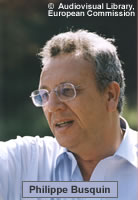Busquin and Mitsos request NCP nominations
As preparations for the Sixth Framework programme (FP6) continue, EU Research Commissioner Philippe Busquin and Director-General of the Research DG Achilleas Mitsos have both sent personal letters to all the Member States' and Associated States' Research Ministers and national representations, requesting nominations for National Contact Point (NCP) representatives. 'One of the major challenges for a smooth launch and a successful operation of FP6 is to give appropriate information and assistance to potential participants, especially in mind of the new features of FP6, most notably its contribution to the ERA [European research area] concept, the new instruments, the need for reinforced support to SMEs [small and medium sized enterprises] and the mobilisation of the best scientists in the national and industrial research communities,' writes Mr Busquin in his letter to Europe's Research Ministers. 'This challenge can only be met by a joint effort of the Commission and the Member and Associated States.' The NCPs were established under the Fifth Framework programme (FP5) to inform and assist potential and existing project participants and contractors. They are run by a number of different actors across Europe, from ministries and universities to research centres, agencies and consulting companies. The diversity in actors running the NCPs reflects different national traditions, working methodologies, research landscapes and funding schemes. NCPs are established, financed, nominated and monitored by national governments, while the Commission provides necessary information and training and acts as a moderator for transnational networking. In his letter to national representations, Dr Mitsos suggests that future support from the Commission may be more far reaching than was the case under FP5. 'We are currently reflecting on possibilities for support going beyond the enclosed guiding principles and will come back to your authorities in due course for an in-depth discussion of the possible options,' writes Dr Mitsos. In his letter, Mr Busquin also pledges further support for NCPs: 'On our side, the Commission will increase its effort in continuous training and exchange of information with NCPs as well as assisting the cooperation between the NCPs and in raising their visibility by all possible means.' The Commissioner also underlines the important role that NCPs play in the functioning of the Framework programmes. 'The role of the NCPs in the success of FP6 as a value-added decentralised system giving personalised support on the spot and in proposers' own languages cannot be overemphasised. I am convinced that in establishing your NCP system you will share my strategic vision,' writes Mr Busquin. The guidelines for setting up NCPs for FP6 are now available (see reference below). The guidelines contain information on the basic principles, recommended tasks for NCPs, organisations which may operate the NCPs, the nomination and recognition process and the relationship between NCPs and the Commission.

